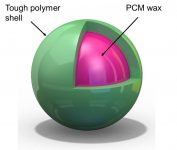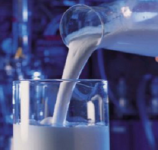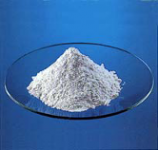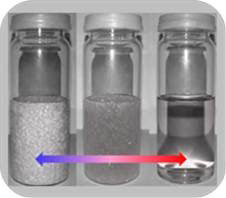 Materials that in their solid form are crystalline waxes containing saturated aliphatic hydrocarbon units (-CH2)n-) within the molecular structure. The most common are the “paraffins” i.e. linear hydrocarbons also known as n-alkanes with chemical formula CnH2n+2. Recent developments have taken place in oleochemical PCMs. For example, fatty acid esters, fatty alcohols and even paraffins can be derived from plant lipids or animal fats. These types can be considered to be renewable and may be referred to as “bio-based PCMs”. The best commercially available organic wax PCMs offer the advantages of high latent heat capacity (usually between 170 – 220 kJ/kg), sharp thermal transitions, minimal supercooling, reliable thermal properties and long term stability. Another advantage is the range of phase change temperatures available, which can meet most applications excluding very high temperatures. Several suppliers offer materials varying in quality and price and Phase Energy can assist in sourcing the best product
Materials that in their solid form are crystalline waxes containing saturated aliphatic hydrocarbon units (-CH2)n-) within the molecular structure. The most common are the “paraffins” i.e. linear hydrocarbons also known as n-alkanes with chemical formula CnH2n+2. Recent developments have taken place in oleochemical PCMs. For example, fatty acid esters, fatty alcohols and even paraffins can be derived from plant lipids or animal fats. These types can be considered to be renewable and may be referred to as “bio-based PCMs”. The best commercially available organic wax PCMs offer the advantages of high latent heat capacity (usually between 170 – 220 kJ/kg), sharp thermal transitions, minimal supercooling, reliable thermal properties and long term stability. Another advantage is the range of phase change temperatures available, which can meet most applications excluding very high temperatures. Several suppliers offer materials varying in quality and price and Phase Energy can assist in sourcing the best product
Organic wax PCMs can be formulated into permanently solid or gelled forms and enclosed within robust containers to prevent leakage whilst allowing for the exchange of thermal energy between the transfer medium (usually air) and PCM. It is possible for the PCM to be either mouldable or rigid (shape-stable) and various containment options are potentially available including pouches, bags, blankets, moulded panels and other rigid containers in various sizes and geometries. Where flammability is a concern then solutions are available depending on the requirements of the application. If you are a PCM supplier or user then we can help you to quickly develop suitable forms of organic PCM, so do not hesitate to contact us to discuss your project.
Organic PCMs are also available in a microencapsulated form where the PCM is permanently enclosed within microscopically small particles – see microencapsulated PCMs


 Materials that in their solid form are crystalline waxes containing saturated aliphatic hydrocarbon units (-CH2)n-) within the molecular structure. The most common are the “paraffins” i.e. linear hydrocarbons also known as n-alkanes with chemical formula CnH2n+2. Recent developments have taken place in oleochemical PCMs. For example, fatty acid esters, fatty alcohols and even paraffins can be derived from plant lipids or animal fats. These types can be considered to be renewable and may be referred to as “bio-based PCMs”. The best commercially available organic wax PCMs offer the advantages of high latent heat capacity (usually between 170 – 220 kJ/kg), sharp thermal transitions, minimal supercooling, reliable thermal properties and long term stability. Another advantage is the range of phase change temperatures available, which can meet most applications excluding very high temperatures. Several suppliers offer materials varying in quality and price and Phase Energy can assist in sourcing the best product
Materials that in their solid form are crystalline waxes containing saturated aliphatic hydrocarbon units (-CH2)n-) within the molecular structure. The most common are the “paraffins” i.e. linear hydrocarbons also known as n-alkanes with chemical formula CnH2n+2. Recent developments have taken place in oleochemical PCMs. For example, fatty acid esters, fatty alcohols and even paraffins can be derived from plant lipids or animal fats. These types can be considered to be renewable and may be referred to as “bio-based PCMs”. The best commercially available organic wax PCMs offer the advantages of high latent heat capacity (usually between 170 – 220 kJ/kg), sharp thermal transitions, minimal supercooling, reliable thermal properties and long term stability. Another advantage is the range of phase change temperatures available, which can meet most applications excluding very high temperatures. Several suppliers offer materials varying in quality and price and Phase Energy can assist in sourcing the best product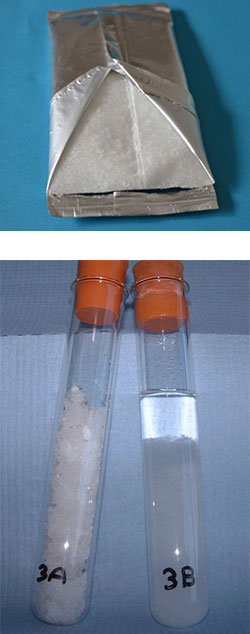 Salt hydrates are inorganic substances composed of ionic salts with crystal phase structures incorporating water molecules (“water of crystallisation”). Pure substances can have high heat capacity, relatively high density and therefore high volumetric heat storage capacity. Many commercial salt hydrate products, however, are carefully formulated to achieve a suitable operating temperature and to overcome shortcomings, notably a tendency to supercool and physical instability. The latter arises if the formulation melts incongruently i.e. where the crystalline solid phase melts to a mixture of solid and water (rather than a “clean” solid to liquid transition). The dense solid phase may be prone to sedimentation over time and additives such as inorganic or polymeric gelling or thickening agents can be used for stabilisation. This is essential as separation would lead to a gradual reduction in the concentration of the “active” PCM component and deterioration in the thermal transition properties.
Salt hydrates are inorganic substances composed of ionic salts with crystal phase structures incorporating water molecules (“water of crystallisation”). Pure substances can have high heat capacity, relatively high density and therefore high volumetric heat storage capacity. Many commercial salt hydrate products, however, are carefully formulated to achieve a suitable operating temperature and to overcome shortcomings, notably a tendency to supercool and physical instability. The latter arises if the formulation melts incongruently i.e. where the crystalline solid phase melts to a mixture of solid and water (rather than a “clean” solid to liquid transition). The dense solid phase may be prone to sedimentation over time and additives such as inorganic or polymeric gelling or thickening agents can be used for stabilisation. This is essential as separation would lead to a gradual reduction in the concentration of the “active” PCM component and deterioration in the thermal transition properties.